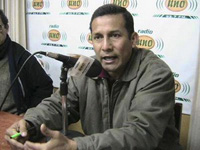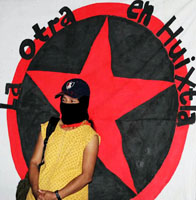Feature Archives
Tue Aug 1 2006
Fidel Castro's Health Forces Him to Step Down, Temporarily
Cuban President Fidel Castro handed over power for the first time in his nearly 50 years at the head of the Caribbean island nation on July 31st. A recent trip to Argentina, as well as the July 26th celebration of the anniversary of the assault on the Moncada barracks, have taken a toll on the 79 year-old man's health. Castro was forced to undergo emergency surgery to correct intestinal bleeding and was reportedly recovering on Tuesday night. Castro "provisionally" delegated his presidential duties to his brother, for what Fidel predicted would be a period of several weeks.
Mon Jul 10 2006 (Updated 07/16/06)
"No to the Damn Fraud": López Obrador the Likely Winner in Mexico
The Mexican election of July 2 is the most contested presidential vote in Mexico’s history. At a massive demonstration in the capitol (the Mexican government estimated there were 280,000), protesters chanted “No to the damn fraud!” The candidate of the leftist PRD, Ándres Manuel López Obrador, likely beat the declared winner, Felipe Calderón of the PAN. López Obrador told the crowd, “We are confronting a powerful group, economically and politically, that are accustomed to winning at all costs, without moral scruples. If there is not democracy, there will be instability.”
Sun Jul 9 2006 (Updated 07/10/06)
CISPES Solidarity Demonstration
On July 7th, Bay Area CISPES (Committee in Solidarity with the People of El Salvador) and supporters protested violence in San Salvador that led to the death of multiple people, along with dozens injured, which is being called the worst violation of human rights since the signing of the 1992 Peace Accords.
 Photos
Photos
 Photos
Photos
Sun Jun 18 2006 (Updated 06/14/10)
400,000 March In Oaxaca Against Government Oppression
On Friday June 16th, a teachers’ march in Oaxaca brought out all sectors of civil society in a vast repudiation of the repressive policies of Governor Ulises Ruiz Ortíz. The march of as many as 400,000 protesters was a direct response to the brutal police attack on the encampment of striking teachers in the center of the city at dawn on June 14th. In San Francisco, thirty teachers from United Educators of San Francisco and the American Federation of Teachers at City College demonstrated in front of the Mexican Consulate.
Photos & Video
Wed May 10 2006
The Struggle in San Salvador Atenco, Mexico
The Zapatistas declared a red alert on May 3rd in regard to the calamitous situation in Texcoco and San Salvador Atenco, towns just outside of the Mexican capital. Just before, police had attempted to drive flower vendors in Texcoco from their market to make way for a Wal-Mart. The community resisted, over a hundred were arrested, and police used tear gas and live ammunition, killing a 14 year-old boy, Javier Cortés Santiago. The police continued with a campaign of terror, attacking and dragging from their homes hundreds of people suspected of activism. According to the Daily El Universal nearly two hundred were then charged with "organized delinquency," a charge that does not allow for bail and can lead to sentences from two to ten years in prison.
The Mexican media glossed over police violence and focused instead on theories about acts of violence by townspeople. In a flyer distributed May 9, activists wrote: "Don’t let the 'news' cloud your vision when it says that behind Atenco there are 'dark interests.' Nothing could be further from the truth. Behind our resistance there are no dark interests, but instead the crystal clear conviction to defend our rights, our land, our labor, for Atenco and for all of Mexico. Dark interests are the party mafias, the government of Vicente Fox [and] the municipal administrations of Atenco and Texcoco, who provoked this conflict and do not have the slightest intention of resolving it."
Controversy is not new to Atenco; in 2002 it was the proposed site of a new airport before the people there refused and stopped the project. A peaceful march of thousands led by Subcomandante Marcos streamed into Atenco on May 5.
 Video from Atenco |
Video from Atenco |
 Audio of EZLN Call for Red Alert |
Atenco Prisoners Launch Hunger Strike |
Communique from Atenco Prisoners May 10 |
Indybay Coverage of Bay Area Solidarity with Atenco |
Link to English Coverage on IMC Mexico |
ZNet Coverage |
See Narco News for "The Other Journalism"
Audio of EZLN Call for Red Alert |
Atenco Prisoners Launch Hunger Strike |
Communique from Atenco Prisoners May 10 |
Indybay Coverage of Bay Area Solidarity with Atenco |
Link to English Coverage on IMC Mexico |
ZNet Coverage |
See Narco News for "The Other Journalism"
The Mexican media glossed over police violence and focused instead on theories about acts of violence by townspeople. In a flyer distributed May 9, activists wrote: "Don’t let the 'news' cloud your vision when it says that behind Atenco there are 'dark interests.' Nothing could be further from the truth. Behind our resistance there are no dark interests, but instead the crystal clear conviction to defend our rights, our land, our labor, for Atenco and for all of Mexico. Dark interests are the party mafias, the government of Vicente Fox [and] the municipal administrations of Atenco and Texcoco, who provoked this conflict and do not have the slightest intention of resolving it."
Controversy is not new to Atenco; in 2002 it was the proposed site of a new airport before the people there refused and stopped the project. A peaceful march of thousands led by Subcomandante Marcos streamed into Atenco on May 5.
 Video from Atenco |
Video from Atenco |
 Audio of EZLN Call for Red Alert |
Atenco Prisoners Launch Hunger Strike |
Communique from Atenco Prisoners May 10 |
Indybay Coverage of Bay Area Solidarity with Atenco |
Link to English Coverage on IMC Mexico |
ZNet Coverage |
See Narco News for "The Other Journalism"
Audio of EZLN Call for Red Alert |
Atenco Prisoners Launch Hunger Strike |
Communique from Atenco Prisoners May 10 |
Indybay Coverage of Bay Area Solidarity with Atenco |
Link to English Coverage on IMC Mexico |
ZNet Coverage |
See Narco News for "The Other Journalism"
Mon Apr 17 2006
Ollanta Humala Leads Peruvian Election
The leader in the April 9 election for president of Peru was Ollanta Humala, a former army colonel who was backed by leaders Hugo Chávez of Venezuela and Evo Morales of Bolivia. Humala led an unsuccessful coup attempt in 2000 against President Alberto Fujimori, who was later impeached. He is a populist who promises to help the poor, and a nationalist who wants to expropriate businesses that were privatized under the previous regime of Alejandro Toledo. As of April 15, with 88% of the vote counted, second place was still too close to call between former president Alan Garcia and conservative Lourdes Flores. Because no one got over 50%, there will be a runoff between the two top vote-getters in mid-May. A commentator on Indymedia Peru said: "The old practice of corruption which is the fruit of the centralization of power will not be changed by any president, despite how the illustrious orators paint themselves as messiahs to the beat of reggaeton."
Peru Indymedia Commentary (In Spanish) | Election Coverage | Narco News Coverage | People's Weekly World Analysis
Peru Indymedia Commentary (In Spanish) | Election Coverage | Narco News Coverage | People's Weekly World Analysis
Mon Jan 30 2006
Government Repression and Harassment follows the Other Campaign
Ostensibly, the Mexican government is welcoming Delegate Zero's tour
throughout Mexico, but several communities participating in the Other
Campaign have reported harrassment and threats from government and
paramilitary agents. Communities involving themselves with the Other Campaign face a great risk of reprisal from other organized groups before and after the arrival of Delegate Zero. For its revolutionary nature, the EZLN is not welcomed in many sectors of Mexican society. During their twelve-year public
existence, EZLN communities have suffered attacks, killings, intimidation
and harassment from the likes of Mexican political parties and
paramilitaries. Continue reading about repression and harassment of the Other Campaign...
Previous coverage: The Other Campaign Begins in Mexico || Por La Sexta: Zapatistas Meet with Civil Society
More coverage of the Other Campaign: Enlace Zapatista || Map of the tour in Mexico || Chiapas CMI || Mexico CMI || CML-DF || Narco News
Previous coverage: The Other Campaign Begins in Mexico || Por La Sexta: Zapatistas Meet with Civil Society
More coverage of the Other Campaign: Enlace Zapatista || Map of the tour in Mexico || Chiapas CMI || Mexico CMI || CML-DF || Narco News
Americas:
 20
20









